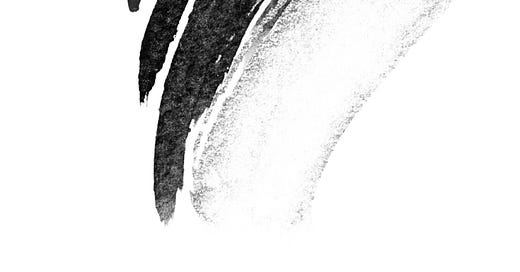Poetry and Business
On how the art of poetry can teach us to lead with more integrity, build better products and grow more valuable businesses
No. 4 took a little longer to write. I wasn’t entirely sure how extensive I could or should expand on this topic. But instead of letting this “sit”, I figured I’d share what I got so far in hopes it would be valuable either way. Plus, I’ll most likely write more on some of the topics I touch on in the future.
I’ve been deeply moved by poetry from an early age. There’s something about poems that spoke to me on a soul-deep level like no other art form did. Maybe it was an escape or maybe the only place where I felt understood. Poetry helped me see, feel and work differently in more ways than one. Below is a collection of notes (and poems) that hopefully does the same for you.
As always, thank you for reading. Please let me know which of these thoughts resonate with you, what you’d like to read more of or send any ideas, questions, and feedback my way via email or the comments.
P.S. I spent the last days in Kingston, NY and wrote this newsletter in a beautiful little coffee shop / bar / bookstore called “Rough Draft” which really couldn’t be any more fitting.
On poetry and business
I distinctly remember how I learned about haikus in middle school and spent days, probably weeks, writing my own haikus into a small old softcover notebook I bought at the local paper store until I filled every page. The constraints of the form of the haiku were such a wonderful creative challenge. Not to mention how I jumped at the opportunity to do my 12th grade book presentation about “Dead Poets Society”.
“We don’t read and write poetry because it’s cute. We read and write poetry because we are members of the human race. And the human race is filled with passion. So medicine, law, business, engineering… these are noble pursuits and necessary to sustain life. But poetry, beauty, romance, love… these are what we stay alive for.”
– Robin Williams as John Keating, Dead Poets Society
It wasn’t until decades later (read the last year or so) – after building countless hardware and software products, leading, managing teams large and small, and working in big tech – that I started exploring my love of poetry more broadly in an effort to expand on the things that fill me up.
Why poetry? What does it give me? What does it take? How did poetry shape me growing up? How does it influence and inspire me today? What did it teach me that I can share and pass on? Would the world be better if more people loved poetry the way I do? How do you teach the love for poetry, or can you even?
And while I’m definitely still in the middle of exploring, I figured there’s some learnings worth sharing:
The more I dug, the more poetry revealed itself as a way of life – beyond the rather obvious aesthetic beauty of expressing a human observation, both internal or external, in the form of verses (or not) and rhyme (or not), using the magnificently inspiring tools of human language, punctuation, and metaphor.
In fact, just a few weeks ago, I found this quote from Andrei Tarkovsky that perfectly describes where my journey has taken me so far. Or maybe the quote found me, who knows.
“When I speak of poetry I am not thinking of it as a genre. Poetry is an awareness of the world, a particular way of relating to reality. So poetry becomes a philosophy to guide a man throughout his life.”
– Andrei Tarkovsky
Ok, Ben, get to the business part, will you?
Now, we could spent extensive time on the spiritual components of poetry, how it enriches our life, and connects us to something bigger than ourselves. Or maybe, better, it connects us to our higher self and in turn to the rest of humanity.
Buț embracing poetry as a way of life (and work), it has deeply influenced the way I lead and manage. More so, my love for poetry has certainly raised my personal standards for quality of thinking and execution – and in turn how to build teams, products and companies.
Poetry is a tool to reduce unconsidered, useless crap.
Poetry asks “why?”, “is this necessary?”, and “what for?”. It teaches us the craft of carefully considering every letter, word and punctuation – or their absence. Writing poetry isn’t about writing as many words as you can. It’s about writing the right words in the right order. It’s as simple and profound as that.
Poetry changes the relationship between product and customer.
People feel how a product was made and who made it. In fact, as I’ve written before, I believe the act of product creation is a transfer of energy from the maker to the user. Poetry makes us care about the details. Because they make all the difference. The details make us smile or cry or laugh. Making a product based on the principles of poetry embeds a deep level of care into each part of the product that resonates with humans on a subconscious level. It has the chance to transform users into fans.
Poetry helps you grow better talent.
When the benchmark is to thoughtfully consider the impact of every thing we do, every letter we write, every word we speak, every piece of the product experience we create, we challenge ourselves to new heights. Poetry drives thoughtful iteration, higher standards of craft and execution. It requires our team to hone their skills beyond a functional, rational level and consider the entirety of the human condition.
Poetry is good for business.
Nowadays where technology is a commodity, companies need to set themselves apart from the competition not only on a rational but emotional level. Emotional storytelling around and through your product(s) becomes essential to drive long-term business success, increasing profits by driving customer loyalty.
Poetry creates a better world.
Poetry forces us to face both our individual impermanence as well as acknowledge our shared humanity and sense of inter-being. It connects us to something bigger than our individual concern and can empower us to consider the positive, lasting impact our actions have on the world. In times where humanity is facing severe global challenges this seems like a worthwhile pursuit.
So, where do we start, you ask?
Using the principles of poetry in your daily business doesn’t require you to read countless poems before going to bed (although I’d highly recommend it!). It’s a simple as making an effort to be more conscious and intentional about the choices you make on a daily basis, and to challenge your teams to do the same.
“For my part is the chorus, and the chorus
Is more or less a borderline between
The you and the me and the it of it.
Between
The gods’ and human beings’ sense of things.
And that’s the borderline that poetry
Operates on too, always in between
What you would like to happen and what will –
Whether you like it or not.
Poetry
Allowed the god to speak. It was the voice
Of reality and justice.”– Seamus Heaney, The Cure at Troy
3 Inspirations
Dead Poets Society – It’s one thing to read the quote above but really you should take a few minutes to watch the clip from the movie.
I found this little book “Play to live” in a vintage bookstore. It’s a collection of Alan Watts’ lectures edited by his son Mark. What inspired me was right the first essay on the abstraction humans make (e.g. money) and how that has shaped what we believe to be true about the world we live in.
This article on living a resourceful life was shared in one of the Farnam Street newsletters and resonated with me.
You made it. Thank you!
Kudos to you for making it all the way to the end. Since this is all new to me, please share your feedback, questions or any topics you’d like me to touch on.
And if you liked what you read, please subscribe and send this newsletter to someone you care about and who would appreciate the content.








